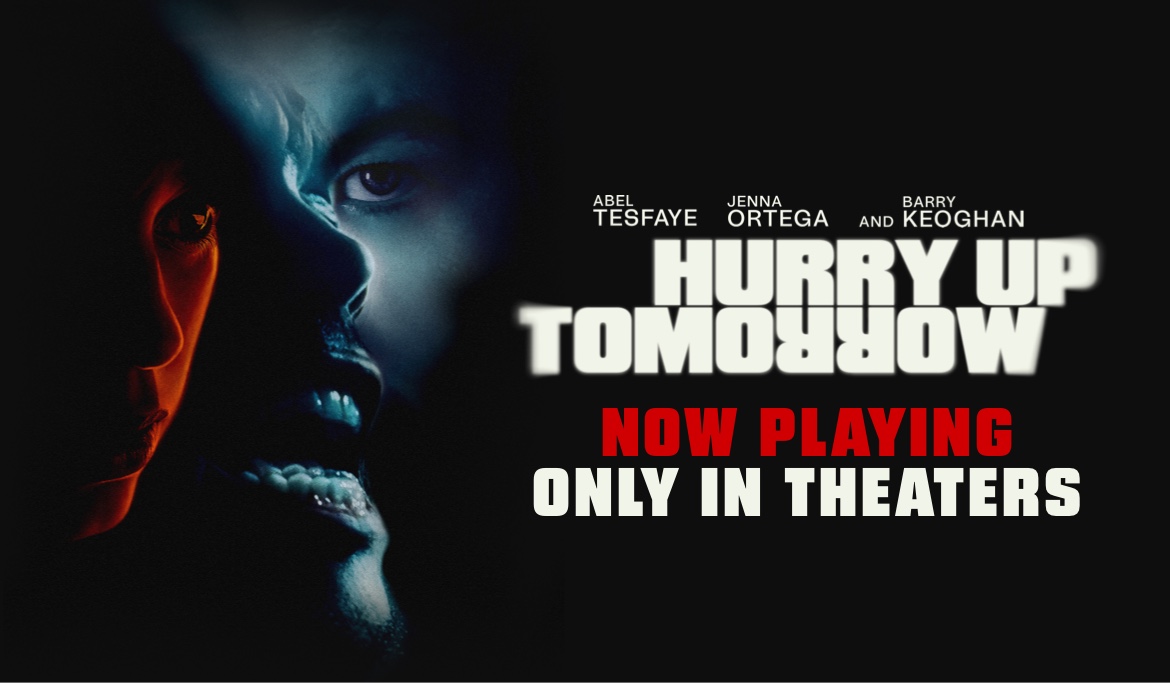
From the start, Hurry Up Tomorrow was a movie lacking direction and plot. When I walked into the Cinépolis theater, I was greeted with an eerie emptiness—my friend and I were the only ones there. The sense of desolation mirrored that of the movie, which had storytelling just as empty as its seats.
Directed by Trey Edward Shults, Hurry Up Tomorrow follows a fictionalized version of “Blinding Lights” singer The Weeknd, as he struggles to live up to his persona. The story centers around three characters: The Weeknd played by himself, his manager/friend Lee (Barry Keoghan), and a mysterious fan named Anima (Jenna Ortega).
At the start of the movie, the audience is thrown into The Weeknd’s pre-show routine, watching him perform onstage in a disorienting combination of concert film and documentary-style storytelling. Onstage, his voice cracks, as inspired by a real event, and he rushes off, attempting to exit the venue. Before he does, Anima intercepts him, and the following sequence of events devolves into what felt like a delirium. What seems like a fun night between the two of them quickly and confusingly deteriorates into a hostage situation and the gruesome murder of The Weeknd’s manager, Lee.
This storyline fails to produce anything cohesive, instead resembling an assortment of disjointed ideas haphazardly glued together with gorgeous cinematography but little substance. The film suffers from a lack of grounding in place, time, and plot, amounting to something that even established actors Jenna Ortega and Barry Keoghan couldn’t save.
Anima’s motivations and backstory are never explained to the audience—even her name is never explicitly mentioned in the film. The audience views only a few choppy scenes portraying her as unhinged, and receives maybe two vague lines about her mom. Similarly, Keoghan, playing Lee, is solid, but his character ultimately rings hollow, with his history never being explored.
Tesfaye’s acting leaves much to be desired, extending only to his ability to shed a few tears—he cries for maybe a fourth of the movie—and not much else. His performance wasn’t believable, but it wasn’t anything unexpected, given his lack of acting experience. The fictionalized version of himself did his acting no favors as well; for the first thirty minutes, The Weeknd barely speaks, leaving the dialogue—and thus, any emotional connection with the character—sparse and flimsy. It also left the movie awkwardly attempting to balance fleshing out a skeleton of a storyline and cutting the unnecessary scenes to carve the way for what could have been a decent narrative. The rest of the movie was such a mess that it overshadowed Tesfaye’s poor acting, as even without it, my impression of the movie would have been just as negative. The film assumes that the audience is already intimately familiar with Tesfaye’s persona, making it difficult for those unfamiliar with him to engage with the character and leaving his character shallow and half-baked.
As someone who is not a dedicated listener, I was not invested in his issues. However, I do applaud him for being vulnerable and showing us what it’s like to have a persona—something I, of course, cannot understand. In that way, this film is a vessel of explanation for his fans—a glimpse into why he’s saying goodbye to The Weeknd and embracing his “real” identity, albeit through an exaggerated and convoluted plot.
The cinematography latched onto that incohesiveness, though the camera work and directing were two of the few things I enjoyed about the film. The camera moves with the characters, with few still shots, contributing to that immersive yet disorienting atmosphere. If anything, the visuals served as the driving force of the storyline—at least more than the dialogue or characters did.
A fan of The Weeknd may find something to appreciate in this chaotic, fever-dream of a film, as it offers a glimpse into the artist’s farewell to his persona. But for anyone who isn’t already a fan—don’t waste your time.